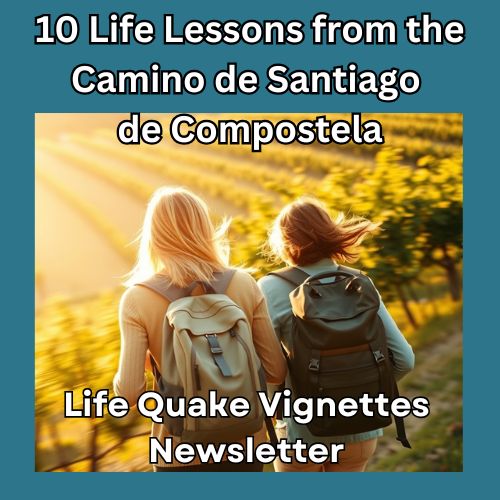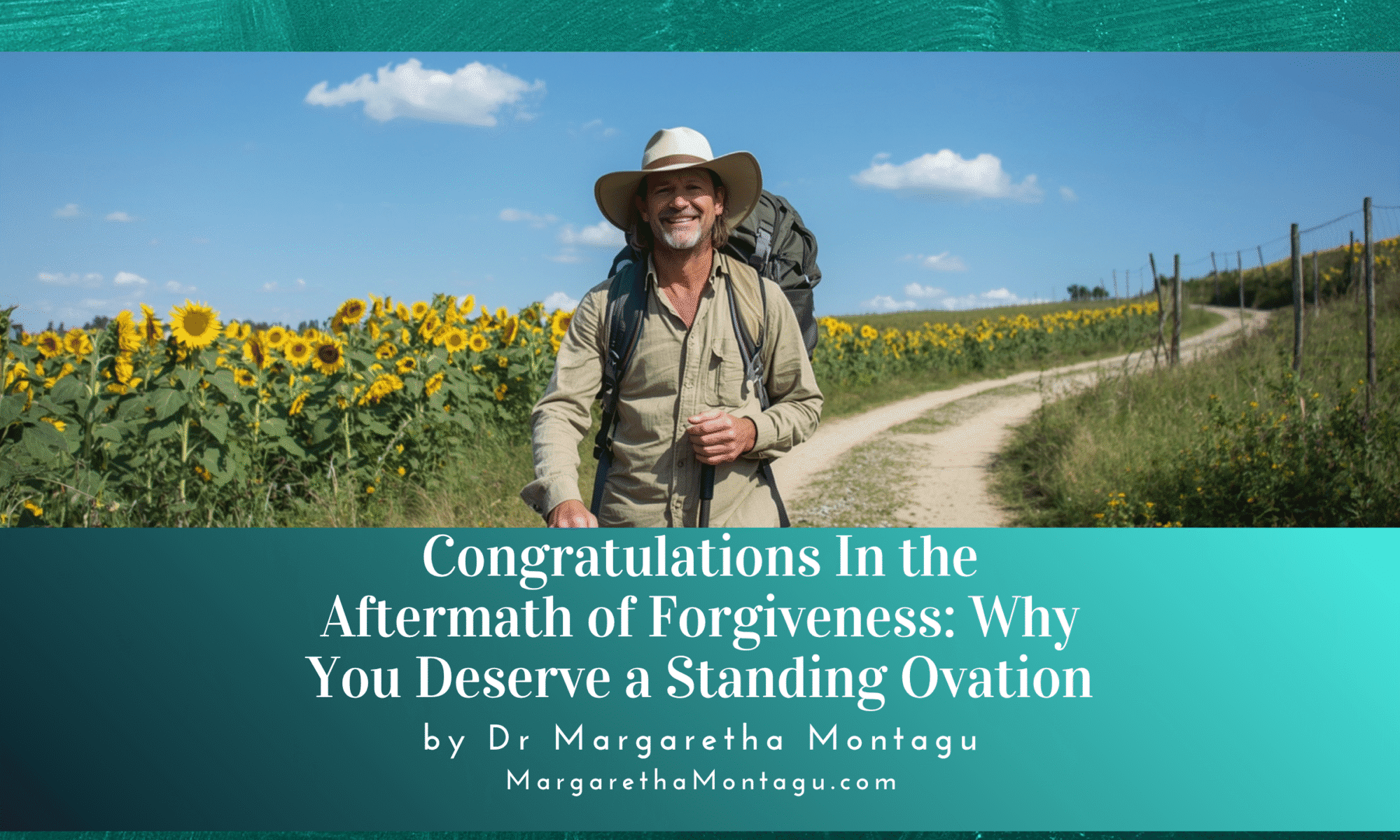Reclaim Your Power and Peace by Celebrating the Courage It Takes to Forgive
What this is: A deep dive into the overlooked final stage of forgiveness: the bit where you actually pat yourself on the back for completing one of life’s most gruelling emotional marathons. Think of it as permission to throw yourself a one-person ticker-tape parade.
What this isn’t: Another “forgiveness is a gift you give yourself” platitude that makes you want to throw something. This isn’t about bypassing your pain or rushing the process. We’re not here to tie everything up with a pretty bow and pretend betrayal doesn’t sting like fury.
Read this if: You’ve done the hard yards of forgiving someone (or yourself), you’re exhausted from the emotional heavy-lifting, and you’re wondering why there’s no certificate, medal, or at least a decent bottle of wine waiting for you on the other side.
5 Key Takeaways
- Forgiveness is a multi-stage process that deserves recognition at every milestone, especially at the very end
- Self-congratulation isn’t narcissism, it’s essential psychological hygiene that reinforces positive behavioural patterns
- The lack of external validation for forgiveness work means you must become your own cheerleader
- Celebrating your forgiveness journey creates neurological pathways that make future emotional work easier
- Acknowledging your achievement prevents resentment from creeping back in through the back door
Introduction: The Silent Achievement
Here’s something nobody tells you about forgiveness: it’s the only Herculean task you’ll ever complete without so much as a participation trophy. You can run a marathon and get a medal. Finish your degree and receive a diploma. Lose weight and people notice. But forgive someone who shattered your trust? Crickets.
We live in a culture obsessed with visible achievements, yet forgiveness, one of the most demanding emotional accomplishments a human being can undertake, happens entirely in the shadows of your psyche. No one rings a bell. No one posts congratulations on your social feed. The person you forgave might not even know you’ve done it.
Admit it: you probably haven’t congratulated yourself either.
We’re brilliant at beating ourselves up for holding grudges, but rubbish at celebrating when we finally let them go. It’s as if we expect forgiveness to be instantaneous, like flicking a light switch, rather than what it actually is: a slow, painful climb up a mountain you never asked to scale in the first place.
As someone who has spent 20 years working with stressed professionals and executives, I’ve witnessed countless successful people who can negotiate million-pound deals, manage teams of hundreds, and juggle impossible schedules, yet they struggle to acknowledge their own emotional victories. The hardest journey isn’t always the one under your feet, it’s the one within.
So let’s change that narrative. Let’s talk about why you deserve a standing ovation for the forgiveness work you’ve done, and why celebrating yourself isn’t optional, it’s essential.
The Story of Elena Rogers: When Forgiveness Feels Like Failure
Elena Rogers sat in her corner office on the 47th floor, watching the September sun paint London in shades of amber and gold. The view was spectacular. Her career was spectacular. Her life, on paper, was spectacular. But inside, she felt hollow, as though she’d been scooped out with a spoon and left to function on autopilot.
Six months earlier, Elena had forgiven her former business partner, Marcus, for the betrayal that had nearly destroyed the company they’d built together over a decade. He’d been siphoning funds, making deals behind her back, undermining her authority with clients she’d nurtured from their first nervous pitch meetings. When the truth emerged, it felt like being hit by a lorry she never saw coming.
The forgiveness hadn’t been a lightning bolt moment. It had been more like erosion, waves of acceptance gradually wearing down the jagged edges of her rage. She’d worked with a therapist. She’d written letters she never sent. She’d walked, and walked, and walked, through parks and along the Thames, trying to make sense of something that would never fully make sense.
And then one morning, she woke up and realised the burning sensation in her chest had faded. She could think about Marcus without her jaw clenching. She could remember the good years without the memories being immediately contaminated by the betrayal. She had, impossibly, forgiven him.
But instead of relief, Elena felt… deflated. Shouldn’t there be fireworks? Shouldn’t she feel transformed, lighter, free? Instead, she just felt tired. Bone-tired. The kind of exhaustion that seeps into your marrow and then sets up camp.
She mentioned it, almost embarrassedly, to her sister during their weekly phone call. “I’ve forgiven Marcus,” she said, the words tasting strange in her mouth.
“That’s good,” her sister replied absently, clearly distracted by her toddler’s demands in the background. “What are you doing for Dad’s birthday?”
That was it. The conversation moved on. No acknowledgement of the Everest she’d just climbed. No recognition of the emotional surgery she’d performed on herself without anaesthesia. Elena felt a fresh wave of something, not anger exactly, but disappointment. She’d expected… more.
What Elena didn’t realise was that she was waiting for external validation for an entirely internal achievement. She was waiting for someone else to hand her the gold star she needed to give herself.
That evening, Elena poured herself a glass of wine, something she rarely did on weeknights. The city lights twinkled below her, each one a life being lived, a story unfolding. She could smell the leather of her sofa, the faint vanilla from the candle she’d lit. The wine was crisp on her tongue, cold and sharp.
She raised her glass to her reflection in the floor-to-ceiling window. “Well done, Elena,” she whispered. The words felt ridiculous. Melodramatic. But also, somehow, necessary. “You did something really bloody hard, and you did it alone, and you did it anyway.”
The tears came then, hot and unexpected, streaming down her face in a way they hadn’t during all those months of anger and processing. These weren’t tears of sadness. They were tears of recognition. Of finally, finally, acknowledging what she’d accomplished.
She’d forgiven someone who didn’t deserve it, not for him, but for herself. She’d chosen peace over vindication. She’d done the work when every instinct screamed to stay bitter, to nurse the wound, to make sure the world knew how wronged she’d been.
And nobody had noticed. Nobody except her.
In that moment, Elena understood something profound: the celebration, the congratulations, the recognition, it all had to come from within. She was the only witness to her own transformation. She was the only one who could truly comprehend what she’d survived and how she’d emerged on the other side.
Why Don’t We Congratulate Ourselves After Forgiveness?
The absence of self-congratulation following forgiveness isn’t accidental; it’s cultural, psychological, and deeply ingrained. I’ve spent two decades exploring this phenomenon with stressed professionals, and I’ve identified several reasons why we skip our own celebration party.
The Invisibility Problem
Forgiveness leaves no physical evidence. There’s no “before and after” photo opportunity. Your colleagues can’t see that you’ve shed 20 pounds of emotional baggage. Unlike external achievements, forgiveness is an internal revolution that looks utterly unremarkable from the outside. We’re conditioned to celebrate visible milestones, not invisible victories.
The “Should” Trap
Many people operate within a framework of shoulds. “I should be able to forgive.” “I should be the bigger person.” “I should have done this months ago.” When we frame forgiveness as an obligation rather than an achievement, we strip it of its celebratory potential. It becomes just another item ticked off an endless to-do list.
The Minimisation Reflex
Successful people are often experts at moving the goalposts on themselves. The moment they achieve something difficult, they immediately focus on what’s next or what’s still imperfect. “Yes, I forgave them, but I still feel sad sometimes.” “I’ve let it go, but I’m still dealing with the consequences.” This relentless focus on what remains undone prevents us from honouring what we’ve already accomplished.
The Humility Myth
There’s a pervasive belief, particularly in British culture, that celebrating yourself is somehow unseemly or arrogant. We’ve confused healthy self-recognition with narcissism. We’ve internalised the notion that proper people don’t make a fuss, even when they’ve done something extraordinary.
The Exhaustion Factor
Frankly, by the time you’ve completed the forgiveness process, you’re knackered. The last thing you want to do is organise a celebration. You just want to collapse on the sofa with a cup of tea and pretend to watch television whilst your brain finally, blissfully, quiets down.
But here’s what 15 years of hosting stress management retreats on the Camino de Santiago has taught me: the celebration isn’t optional. It’s not the cherry on top; it’s the final, crucial stage of the forgiveness process itself.
The Stages of Forgiveness
Understanding forgiveness as a staged process helps us recognise why congratulations matter. Drawing from psychological research and my own clinical experience, here are the stages most people traverse:
Stage One: Impact and Injury
This is the immediate aftermath of betrayal, loss, or harm. You’re in shock. The wound is fresh. Your nervous system is in fight-or-flight mode. This isn’t the time for forgiveness; this is the time for acknowledgement and self-protection. You’re simply trying to survive the emotional tsunami.
Stage Two: Anger and Blame
The shock wears off and fury rushes in to fill the space. This stage is necessary and healthy. Anger is information. It tells you that your boundaries were violated, that something precious was damaged. Many people try to skip this stage because anger feels uncomfortable or “unspiritual.” Don’t. Anger is the bridge between victimhood and empowerment.
Stage Three: Bargaining and Rumination
Your mind becomes a hamster wheel of “what ifs” and “if onlys.” You replay the situation endlessly, trying to find the moment where things went wrong, the place where you could have prevented the damage. This stage is exhausting and can last far longer than the others if you’re not careful.
Stage Four: Depression and Grief
You stop fighting reality and start feeling the full weight of your loss. This is where many people struggle most because they’re not accustomed to sitting with difficult emotions. They want to do something, fix something. But this stage requires you to simply feel.
Stage Five: Acceptance
This isn’t forgiveness yet. Acceptance means you’ve stopped fighting with reality. You’ve acknowledged that what happened, happened, and you cannot change it. You’ve integrated this painful truth into your life narrative.
Stage Six: Meaning-Making
Here, you begin to explore what this experience has taught you. How have you grown? What have you learned about yourself, about others, about life? This is where post-traumatic growth begins to emerge from post-traumatic stress.
Stage Seven: Forgiveness
Finally, you reach a place where the person or situation no longer holds power over your emotional wellbeing. You’ve released the need for revenge or vindication. You’ve chosen peace over being right. This doesn’t mean forgetting or excusing the behaviour. It means you’re no longer willing to let the past poison your present.
Stage Eight: Celebration (The Forgotten Stage)
This is where most people drop the ball. Having completed one of life’s most demanding emotional journeys, they simply… move on. They miss the crucial opportunity to consolidate the learning, reinforce the new neural pathways, and honour the incredible work they’ve done.
Each of these stages deserves attention and respect. The journey through forgiveness isn’t linear; you might circle back through stages, and that’s perfectly normal. But the celebration? That’s non-negotiable.
How Forgiveness Changes Everything: The Ripple Effect
When you forgive, you don’t just free yourself from the prison of resentment, you fundamentally alter your relationship with the world. This has implications far beyond your individual wellbeing.
Research in positive psychology demonstrates that forgiveness reduces stress hormones, lowers blood pressure, improves sleep quality, and strengthens immune function. These aren’t minor benefits; for busy executives and professionals already operating at maximum capacity, these improvements can mean the difference between thriving and burning out.
But the transformation extends further. When you model forgiveness, you give others permission to do the same. Your children watch how you handle betrayal and learn emotional resilience. Your team observes how you navigate conflict and learns that mistakes don’t define people. Your community witnesses your grace and remembers that redemption is possible.
I’ve written eight non-fiction books exploring divorce, loss, illness, and coping with change, Challenges and crises because I’ve seen firsthand how one person’s journey can illuminate the path for countless others. The 30-plus testimonials on my website aren’t just about individual transformations; they’re evidence of how personal healing ripples outward, touching everyone in its path.
Consider Elena from our earlier story. Her forgiveness of Marcus didn’t just free her from bitterness; it changed how she led her team. She became more patient with mistakes, more willing to have difficult conversations, more focused on solutions than blame. Her entire leadership style evolved because she’d done the internal work of forgiveness.
Your forgiveness journey, whatever form it takes, has the potential to be equally transformative, not just for you, but for everyone you encounter. That’s worth celebrating.
A Gratitude Practice to Sustain the Forgiveness Process
Each evening for the next seven days, write down three specific things you’re grateful for related to your forgiveness journey. These might include:
- The strength you discovered you possessed
- The people who supported you (even if they didn’t fully understand)
- The lessons you learned about yourself
- The damage you didn’t do
- The peace you now experience
- The freedom to move forward
This practice rewires your brain to associate forgiveness with positive outcomes rather than just the painful process.
Further Reading: Four Unconventional Books on Forgiveness
- “The Sunflower: On the Possibilities and Limits of Forgiveness” by Simon Wiesenthal – A Holocaust survivor’s meditation on whether some things are unforgivable. I include this because it honours the complexity of forgiveness and doesn’t offer easy answers.
- “Forgive for Good” by Dr Fred Luskin – Based on scientific research at Stanford University, this book provides evidence-based techniques for forgiveness. I appreciate that it treats forgiveness as a learnable skill rather than a personality trait.
- “Left to Tell” by Immaculée Ilibagiza – A Rwandan genocide survivor’s journey to forgive her family’s killers. This book demonstrates the extraordinary capacity of the human spirit and makes our own forgiveness challenges feel navigable by comparison.
- “The Dance of Anger” by Harriet Lerner – While not exclusively about forgiveness, this book brilliantly explains why we must honour our anger before we can genuinely forgive. It’s the missing piece most forgiveness books ignore.
P.S. My book, “Embracing Change, in 10 minutes a day,” offers practical daily practices that support the forgiveness process by helping you navigate life transitions with greater ease and self-compassion.
Testimonial: Sarah’s Journey on the Camino
“I came to Dr Montagu’s Camino de Santiago walking retreat carrying three years of bitterness towards my ex-husband like a rucksack full of rocks. I thought I’d forgiven him, moved on, done the work. But during a storytelling circle with her Friesian horses, something cracked open. I realised I’d never actually congratulated myself for the forgiveness I’d already accomplished. I’d been so focused on what still hurt that I couldn’t see how far I’d travelled. Dr Montagu helped me understand that celebration isn’t self-indulgence; it’s completion. On the final day of the retreat, I stood on a hilltop in southwest France and literally applauded myself. It sounds ridiculous, but it was one of the most powerful moments of my life. I finally felt free.” – Sarah M., Management Consultant, London
FAQs: What You’re Really Asking About Forgiveness
Does forgiving someone mean I have to reconcile with them?
Absolutely not. Forgiveness is internal; reconciliation is external. Forgiveness means you’ve released the emotional charge around what happened. Reconciliation means re-establishing a relationship. You can forgive someone and never speak to them again. You can forgive and maintain firm boundaries. Forgiveness doesn’t require you to be naive or to put yourself back in harm’s way.
What if I’ve forgiven someone but still feel angry sometimes?
That’s completely normal. Forgiveness isn’t a permanent state of zen. It’s more like a direction you’re moving in. You might have moments where old anger flares up, especially if you encounter triggers. This doesn’t mean you haven’t truly forgiven; it means you’re human. The key is that the anger no longer dominates your emotional landscape or controls your decisions. “Emotional forgiveness is much harder and takes longer, as it’s common for those feelings to return on a regular basis,” says Dr. VanderWeele, co-director of the Initiative on Health, Religion, and Spirituality at the Harvard T.H. Chan School of Public Health. “This often happens when you think about the offender, or something triggers the memory, or you still suffer from the adverse consequences of the action.”
How do I know if I’ve actually forgiven someone or if I’m just suppressing my feelings?
Suppression requires constant energy to keep feelings pushed down. True forgiveness brings a sense of spaciousness and ease. Ask yourself: Can I think about this person or situation without my body tensing up? Am I free to talk about what happened without needing to make them the villain? Do I wish them ill or am I indifferent to their situation? Suppression feels heavy; forgiveness feels light.
Is it possible to forgive too quickly?
Yes. Rushed forgiveness is often spiritual bypassing, a way of avoiding the difficult emotions that need to be processed. Genuine forgiveness can’t be forced or hurried. If you’re pushing yourself to forgive because you “should” or because someone else expects it, you’re not actually forgiving, you’re performing forgiveness. Give yourself permission to move through the stages at your own pace.
Should I tell the person I’ve forgiven them?
It depends entirely on the situation and your motivations. Ask yourself why you want to tell them. Is it to free yourself from the need for their response? Is it to restore a relationship? Is it because you think it will help them? Sometimes sharing your forgiveness can be healing for both parties. Other times, it reopens wounds or creates expectations that aren’t healthy. The forgiveness itself doesn’t require their participation or acknowledgement.
Conclusion: The Standing Ovation
Here’s what I know after 20 years of working with stressed professionals and 15 years of walking the Camino de Santiago with people in transition: the hardest journeys are the ones nobody sees.
You’ve climbed a mountain that has no summit marker, run a race with no finish line tape, completed a transformation that leaves no visible scar. You’ve chosen peace over bitterness, grace over grudges, freedom over being right.
And you did it without a roadmap, without a cheering section, without any guarantee that it would work.
That deserves recognition. Not from me, not from the person you forgave, not from anyone else. It deserves recognition from you.
So here’s your permission slip: Stop waiting for someone else to notice. Stop minimising what you’ve accomplished. Stop moving immediately to the next challenge without pausing to honour this one.
Take a moment. Pour yourself that glass of wine or that perfect cup of tea. Stand in front of a mirror if you need to. And say the words out loud: “I forgive you, and I’m proud of myself for doing the work.”
You’ve earned it.
As the poet Maya Angelou so perfectly expressed: “It is one of the greatest gifts you can give yourself, to forgive. Forgive everybody.” But I’d add this: another great gift you can give yourself to acknowledge that you’ve done it.
Congratulations. You’ve done something remarkable.
Your Next Step: The Inner Camino Experience
Imagine standing on a hillside in the sun-drenched southwest of France, the Pyrenees mountains magnificent in the distance, your feet on an ancient pilgrimage path that has witnessed a thousand years of transformation.
You walk sections of the historic Camino de Santiago, yes, but you’re not just covering physical distance, your’re traversing the internal landscape of personal growth.
Each day combines mindful walking through stunning French countryside with practical stress management tools drawn from my 20 years as a medical doctor specialising in stress-related conditions. We practice meditation and mindfulness exercises that calm your nervous system and create space for genuine peace. And perhaps most powerfully, we gather in storytelling circles with my Friesian horses, majestic beings whose quiet presence helps us access truths we’ve been carrying but haven’t yet spoken.
These aren’t ordinary retreats. They’re carefully crafted experiences where forgiveness is not just discussed but embodied. Where your achievements are witnessed and celebrated. Where you finally get the recognition and support your journey deserves.
The southwest of France provides the perfect backdrop for this work: rolling green hills, medieval villages, paths worn smooth by millions of pilgrims seeking their own answers. The slower pace, the absence of daily demands, the beauty of the landscape itself, it all conspire to help you finally breathe.
You’ve done the hard work of forgiveness. Now it’s time to consolidate that achievement, to integrate your learning, and to step fully into the next chapter of your life, whatever that might be.
Click Here to discover dates, programme details, and everything else you need to know about joining us.










10 Powerful Life Lessons Learned While Walking the Camino de Santiago – a free guide filled with 10 not just “quaint anecdotes” or Instagram-worthy moments (though there are plenty of those) but real transformations from real people who walked the same insight-giving trail you might want to walk one day – Subscribe to my monthly newsletter to Download the Guide
Dr Margaretha Montagu is a medical doctor (MBChB, MRCGP), NLP Master Practitioner, Medical Hypnotherapist, and Life Transition Coach with 20 years of experience helping professionals manage stress and navigate life’s challenges. She is the author of eight non-fiction books and has guided hundreds of people through transformative experiences on the Camino de Santiago.

Author Bio: Dr Margaretha Montagu – described as a “game changer”, “gifted healer”, “guiding light” and “life-enriching author” – is an experienced medical doctor, a certified NLP practitioner, a medical hypnotherapist, an equine-assisted psychotherapist (EAGALAcertified) and a transformational retreat leader who guides her clients through life transitions – virtually, or with the assistance of her Friesian and Falabella horses, at their home in the southwest of France.
References
Mróz J, Kaleta K. Forgive, Let Go, and Stay Well! The Relationship between Forgiveness and Physical and Mental Health in Women and Men: The Mediating Role of Self-Consciousness. Int J Environ Res Public Health. 2023 Jun 26;20(13):6229.
Feng Gao, Yuanwei Li, Xuejun Bai, Forgiveness and subjective well-being: A meta-analysis review, Personality and Individual Differences, Volume 186, Part B, 2022, 111350, ISSN 0191-8869

